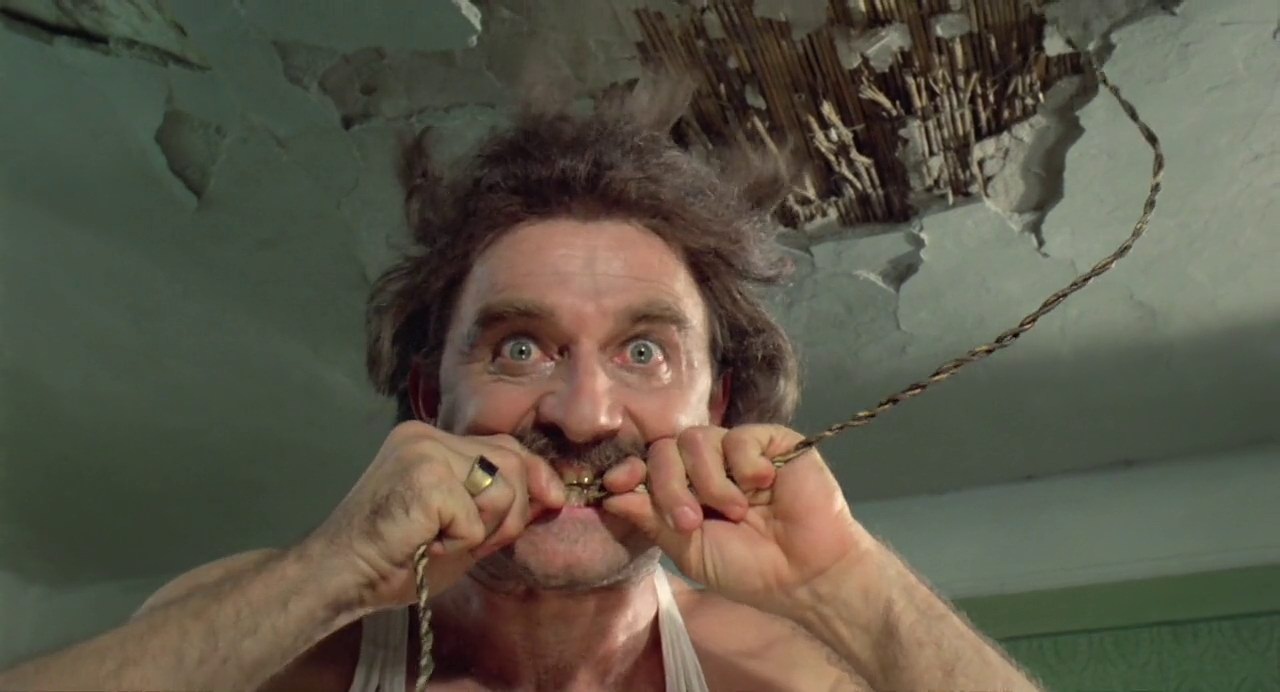
The history of Serbian cinema dates back to the Yugoslav period, and it is heavily influenced by the Yugoslavian cinema. In fact, it is important to draw a clear line between the two periods and decide on the beginnings of the Serbian cinema.
Therefore, due to the numerous changes of the name and territorial changes that led to the disintegration of the country, this list will include only movies that are made after 1990, as they are considered a part of Serbian and not Yugoslavian cultural heritage.
Some of the classics of the Yugoslav cinema that made huge influence on the Serbian culture, such as “Ko to tamo peva?” (“Who’s Singin’ Over There?”), “Balkanski špijun” (“Balkan Spy”), “Maratonci trče počasni krug” (“The Marathon Family”), and others (most of them written by the legendary playwright Dušan Kovačević) will NOT be included in this list.
Speaking of the 90s in Serbia, it is important to know that a great deal of movies made both in that period and after the 2000s deal with the topic of war, its consequences on the country and people afterwards, and the period that led to the war itself. Therefore, this list will focus mostly but not exclusively on these kinds of movies.
Apart from the topic of the movies, the main criteria that is used for the choice of the titles on this list is the influence the movies made on Serbian culture and language. It is important to know that once a movie gets the status of a cult movie among Serbian people, it is used in the everyday life of every average Serbian.
A typical example of this phenomenon is the aforementioned Yugoslavian movie called “Who’s Singin’ Over There?“ and the line “Vozi Miško“ (“Drive, Mishko“), which is nowadays uttered whenever someone should start driving.
The third criteria used for this list is the artistic value (directing achievement, performances, editing, etc.). Directors such as Emir Kusturica and Srđan Dragojević, as well as the playwright Dušan Kovačević, are all still alive and well and created masterpieces both before and after the disintegration of Yugoslavia. Their movies are highly appreciated worldwide for being able to present the typical Balkan mentality and the problems that have been bothering these lands for a long time.
15. Promise Me This (2007)
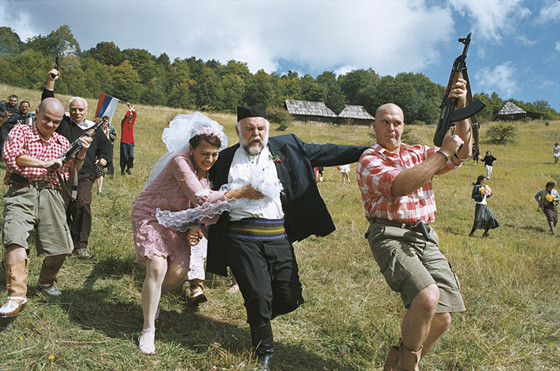
Kusturica’s work, however appreciated around the world, has become quite repetitive – the style utilized by this director is original but it has not changed much in the last two decades, thus resulting in the general drop of quality of his movies. Regardless of this fact, “Promise Me This” (“Zavet”) still managed to become a part of this list, meaning that even his unpopular works deserve huge respect.
“Promise Me This” tells a story about a boy who was sent on a quest by his granddad. His mission was to go to the nearby city, sell the cow, and find a girl to marry.
On his journey, he comes upon various characters, some of which are prototypical for Kusturica’s movies – the mentally unstable people, pimps, cocaine addicts, hookers, and of course, flying people. Furthermore, the film is also filled with other trademarks of Kusturica’s work, such as a lot of gunpowder and explosions, some deliberately disturbing yet hilarious scenes, nudity, and animals.
The main theme of this movie is the rural versus the urban. The boy is a pure soul from the village, unspoiled by the evils that lurk in the city. Often these evil things are a result of the Western influence on the Balkan’s culture in traditions that result in monstrous deeds and characters who are not in their right minds.
The movie did not made a significant influence on the culture in terms of people remembering snappy one-liners; instead, it was the music, written by Kusturica’s son Stribor Kusturica, which penetrated into the Serbian music opus, played in kafanas.
14. Huddersfield (2007)
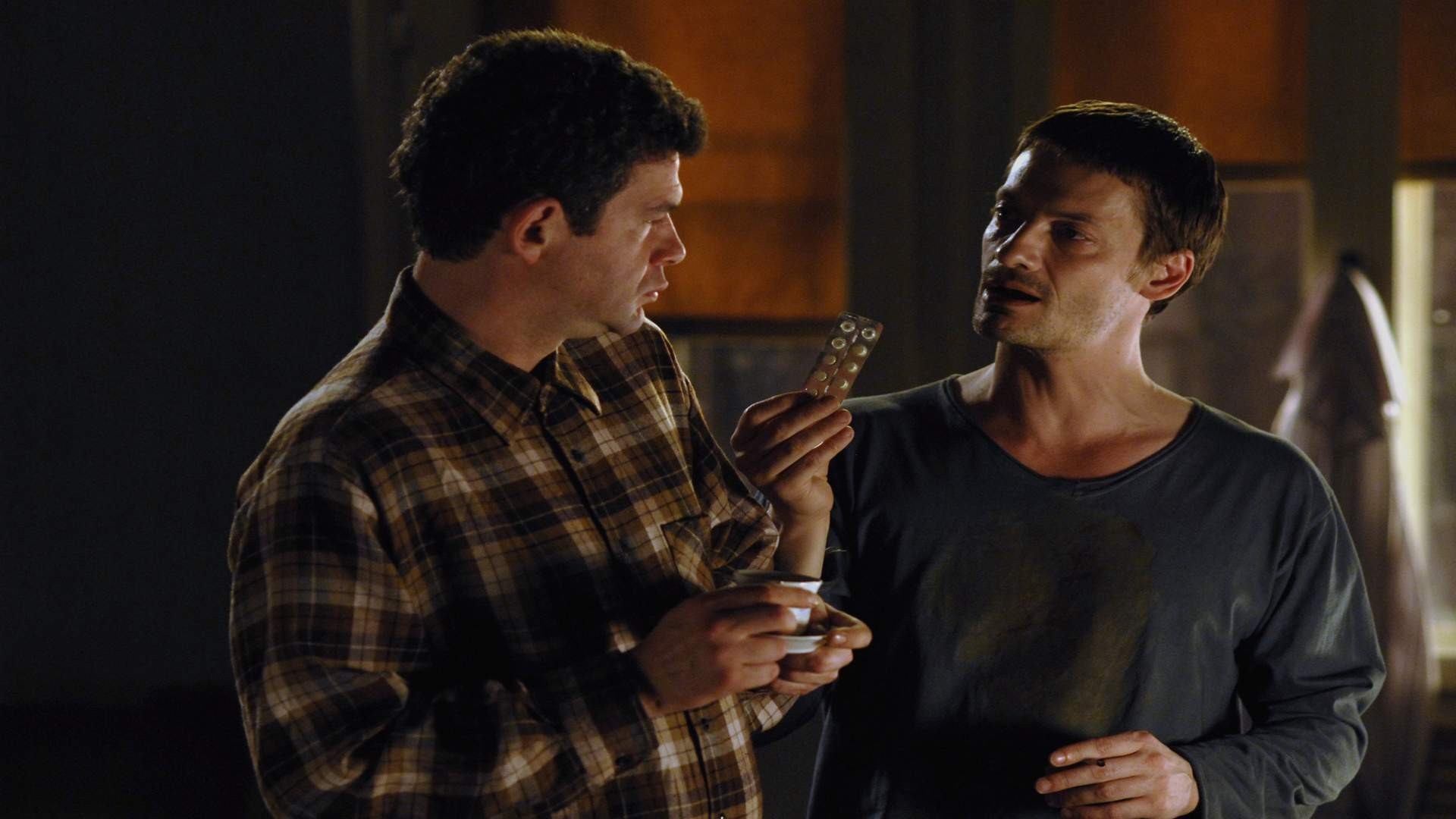
“Huddersfield” was originally a play written by Ugljesa Sajtinac and performed in Belgrade for a few years before being adapted into a movie. The movie never actually achieved popularity, but it gained the status of a cult movie because it is character-based and the characters in it are simply modeled for the Serbian audience to like them. Of course, if it were not for the brilliant actors, especially the talented Nebojša Glogovac, the movie would not be half as appreciated.
The story revolves around a 30-year-old local radio host and literature critic named Rasha, and his social circle that includes his alcoholic father, a mentally-ill neighbor, his teenage student/girlfriend, and a couple of his friends.
The barely idyllic life that Rasha leads, conflicting with his father and his friends, is even more disturbed by the arrival of his friend Igor who has been living in Huddersfield for more than a decade. They organize a meeting of their high school crew, which turns out to be a truly emotional encounter.
This is one of the several movies that tackle the life of generations after the Yugoslav war. They are depressed, without ambitions, prone to alcoholism, and mentally unstable. However helpless, their strength is found within the emotional barriers broken by the arrival of Igor and their discussion about life.
Despite the fact that the story seems tragic, it has fantastic elements of comedy, native to the Serbians and widely accepted by the masses. Josif Tatic, who portrayed the alcoholic father, did it so brilliantly that many believe he was severely intoxicated during the shooting (he was an alcoholic and several of his last roles were drunkards).
13. Seven and a Half (2006)
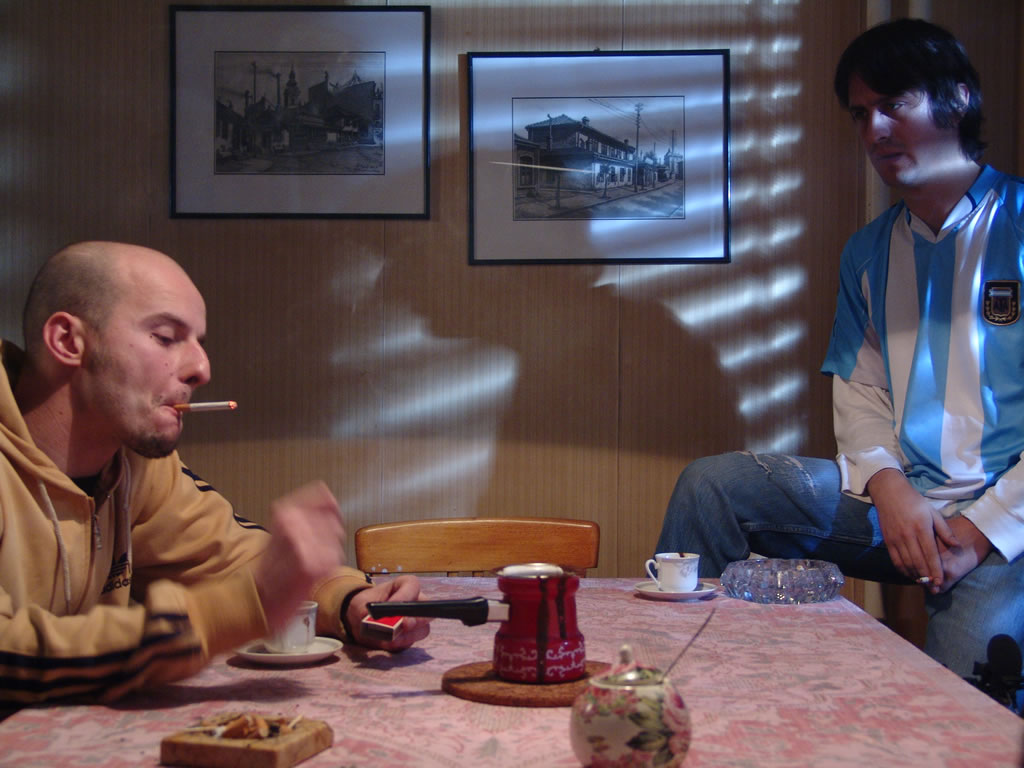
Both written and directed by Miroslav Momcilovic, a script writer of the newer generation who had a few really innovative and moral-questioning works, “Seven and a Half” is a story about seven deadly sins and how they are utilized in contemporary Belgrade. Just like “Huddersfield”, it is a tragedy of one people, cleverly dressed with the clothes of comedy. The title itself is a pun to the Federico Fellini’s masterpiece “8 ½” .
There are seven separate stories, each focusing on one deadly sin. All of them happen in contemporary Belgrade and the only element that connects them are a few minor characters. The stories all differ and some are better than others in terms of narrative and acting performance. The best story features Nenad Jezdic as low-life upstart Adam going to a museum of art made of food with his girlfriend and ending up eating showpieces, only to find out that they were made of human flesh.
Although now a 10-year-old movie, it seems as though it’s fairly new and that it needs time before it settles down in culture and becomes a permanent part of it. Some of the characters are already defined as memorable, as well as some of the lines, such as the one regarding the philosophy of a bodybuilder “Masa je mama!“ (“Mass is the thing!”), pinpointing the importance of constant muscle mass growth.
The best word that describes not only this movie, but the whole generation of movies that deal with war, is tragicomic. This kind of resembles the mentality of the Serbian people and them being fed up with unstable politics and their turbulent history.
12. The Tour (2008)
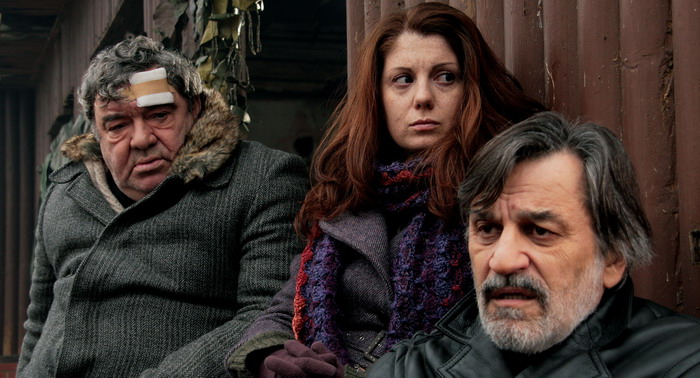
Goran Marković is one of the best working Serbian directors, often being in the shadow of the boisterous Kusturica. Over his long career, he directed more than 20 movies, each highly appreciated by both Serbian and European cinema critics. “The Tour” is one of his latest works, but it is not arguably his best work. However, it tackles the topic of war and the 90s from a very interesting perspective – the perspective of theater actors.
A group of Belgrade theatre actors are sent on a mission to war-torn Bosnia to perform their best pieces for soldiers fighting on the front. On their journey, they come upon a number of people of different ethnic backgrounds – Serbs, Bosnian Muslims, Croats. The irony of it is that they are all well aware of who the actors, are because they gained their popularity throughout all the Yugoslav republics before the civil war.
The important topic covered by this movie is actually not the war but the ignorance of those fighting in it. This is illustrated by a scene where a border soldier who took their passports asks for Jawaharlal Nehru to step out of the vehicle. This is followed by one of the actors quietly uttering that it is the name of the residence of one of the actors.
The best and most memorable performance, which brought this movie to this list, is the one by Sergej Trifunović portraying Arkan, the Serbian war criminal who liberates the actors from Croatian soldiers and then makes them watch as the Croatians go down the minefield.
11. Sky Hook (2000)
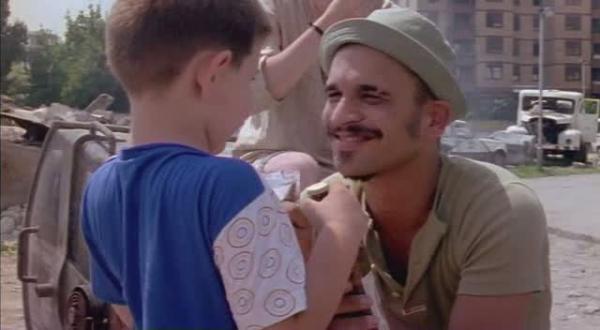
“Sky Hook” is a film about the 1999 bombing of Serbia, which was made immediately after the war. It was directed by Ljubiša Samardžić, who was well known for more than 100 roles at the time but who had never directed a movie before. This is rather visible, not only due to his inexperience, but due to the movie’s extremely low budget.
The story follows Kaja, portrayed by Nebojsa Glogovac, who tries to rebuild a basketball court that was destroyed by one of the NATO air assaults in 1999. Apart from that, he has a supposedly autistic son who stopped talking as a consequence of the bombing. What all the people share in the movie is the love for sports, especially basketball. They all see it as a way to get out of the depressing reality filled with shelters without electricity, debris of nearby buildings, and the roaring of NATO airplanes above their heads.
This movie is very important for Serbian cinema and its people, not because of any kind of artistic achievement (although score by Vlatko Stefanovski is arguably the best score in Serbian cinema). In fact, it means a lot to Serbia because it shows the ability to defy even the biggest superpowers with sport and positive energy.
It is not a coincidence that, during the period when the 90’s Serbian national basketball team won the most medals, it is the only period when they were actually better than a United States dream team. Sasa Djordjević, then player and now a manager of the national team, appears in some of the most touching scenes in the movie.
10. Frozen Stiff (2002)
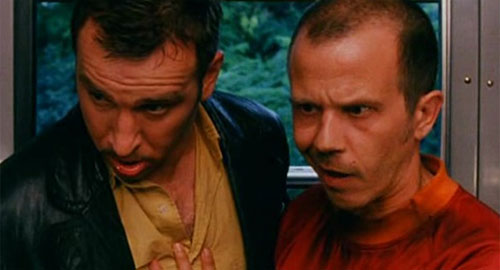
Serbian writers and directors tend to have immense love for dark humor. It all started with “The Marathon Family” – this idea that one can make a funny movie about death and it can achieve immortal status among film lovers. The movie “Frozen Stiff” is one such project, which succeeded big time. The director and the writer of this film, Milorad Milinković, is one of those people who tries to keep up spirits with directing comedies instead of focusing on the dark past.
It is about two brothers, Lemmy and Kiza, portrayed by Nenad Jezdic and Srđan Todorović, respectively, who need to transport their dead grandfather from Belgrade to Vršac by train. Being poor, they decide to dress him up and sit him among passengers, telling them that he is asleep.
The dead granddad’s adventures only begin here, when the brothers leave the train and the passengers suddenly “kill“ the sleeping grandpa, who is thrown out the window afterwards. The story’s pace is more or less the same – the dead body goes on an unexpected quest while the brothers desperately try to find it.
If this movie was shown to someone from outside the Balkans, it would probably be considered a B-class thrash failure of a movie. Even many critics in Serbia think that it could have been realized much better. Regardless of that fact, the characters of the movie are so lovable and memorable that the movie gained instant popularity in Serbia, and the young cast did a really good job, making the audience laugh all the way through to the end.
9. Tito and Me (1992)
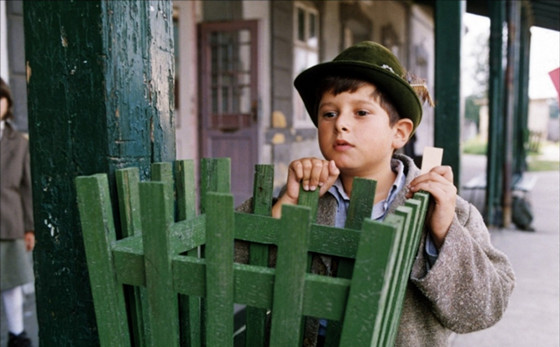
“Tito and Me” is another gem by well-known director Goran Marković. In fact, this is one of his best works and many critics believe that he achieved the peak with this movie. Dimitrije Vojnov is a 10-year-old boy who played the narrator and the protagonist of this movie, which bought him immense fame among the people of Serbia. Interestingly enough, he became a great scriptwriter (“Montevideo”, “Bog te Video”, “Sisanje”), but he never had a role as big as his debut.
The film shows how a 10-year-old naive child sees Tito as his superhero. Although his family is anti-communist, he still manages to write the best poem about Tito in school and win a trip to Tito’s hometown, together with an older girl who he likes and other great students.
What follows is a typical coming-of-age story. What makes the movie different from other coming-of-age movies is how politics is present in Zoki’s narration. Although unaware of who Tito really is, Zoki mentions him constantly as a way to overcome adversity in life.
The movie is important for both Yugoslavian and Serbian cinema as it explains the communist propaganda and how children were brainwashed back in the day, idolizing Tito and Yugoslavia. Furthermore, the somewhat strained relations between people of different ethnicities that led to the breakup is also a topic of “Tito and Ja”, and the director masterfully presented one age and its positive and negative aspects through the eyes of a kid.
Apart from the inevitable talent of then young Dimitrije, most of the actors in this movie are now considered legends of Yugoslavian / Serbian cinema.